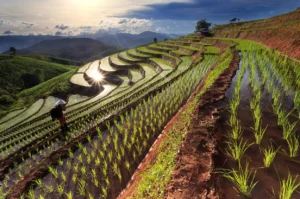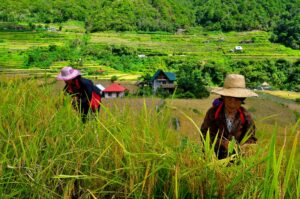by Allan Bomuhangi (IRRI), Jummai O. Yila (IRRI), Eileen Nchanji (Alliance of Bioversity International and CIAT), and Ranjitha Puskur (IRRI)
Introduction
Ensuring equitable access to quality seeds of climate-resilient, high-yielding crop varieties is critical to enhancing agricultural productivity, contributing to food security, and improving the livelihoods of smallholder farmers. However, entrenched barriers such as limited mobility and lack of access to information and resources due to pervasive social norms have long hindered the widespread adoption of these varieties, particularly among marginalized groups like women. Work Package 6 of the CGIAR Seed Equal Initiative, in partnership with the Center for Behaviour Change and Communication (CBCC), is pioneering a social behavior and communication change (SBCC) strategy in Butaleja district, Eastern Uganda, to influence farmers’ attitudes and practices towards using quality seeds. The strategy was co-created in a stakeholder workshop with private and public sector partners, including farmers, seed producers, market actors, agricultural service providers, and district government officials. This strategy was informed by the situation analysis comprising a review of secondary data and primary baseline data.
Empowering Marginalized Communities through YWQCs
A vital component of the Social and Behaviour Change Strategy is placing youth and women at the center of the seed business model. Women and young people of diverse social backgrounds and experiences are included in community-owned and led centers that facilitate and stimulate the adoption of new bean and rice varieties, the production and use of quality seeds, and the adoption of good agricultural practices. Grounded in a socio-ecological resilience framework, the Youth and Women Quality Centers (YWQC) model adeptly combines behavior change with technical interventions to simultaneously address critical barriers across the entire seed value chain.
The Seed Equal WP6 project has established four YWQCs in bean and rice-growing sub-counties – one for beans in the Naweyo sub-county and three for rice in the Mazimasa sub-county. These centers are hosted by youth and women champions who are members of farmers’ cooperative societies. The cooperatives provide a space for women and young people to get information on new varieties, access inputs and gender-friendly technologies (such as portable bean and rice threshers), and link with other agricultural support actors and markets to sell their seeds. The YWQCs drive capacity building in seed entrepreneurship through these spaces, fostering a vibrant and decentralized seed system.

Capacity Building for Lasting Impact
The capacity strengthening component of the YWQC model has equipped 30 youth champions (14 male and 16 female) with a vital set of skills and knowledge in good agronomic practices, seed business, and financial management. The Naweyo YWQC has 13 youth champions, while the Mazimasa, Wapala, Doho, and Namunasa YWQCs have 6, 5, and 6 champions, respectively. Using comprehensive training guides on bean and rice production (Rice cultivation handbook and Bean cultivation handbook), co-developed with the district production department and agricultural officers, these champions have been equipped to train farmers on seed selection, storage, farm management (agronomy), gender and enterprise development. Each champion is tasked with cascading the acquired knowledge and skills to 50-70 smallholder farmers, capacitating a broader network of over 1,500-2,100 farmers to make informed decisions on adopting quality seeds, farm management, and seed production. Farmers are also provided with booklets and posters to support continued learning (“Certified Seed ENOSURE”). Working with existing community radios, these interventions would have potential far-reaching positive effects on millions of farmers in the surrounding districts.
Improving Seed Access and Entrepreneurship
The YWQC model goes beyond just capacity building. These centers also serve as critical access points for quality seeds of improved bean and rice varieties. Through the YWQCs, the Seed Equal WP6 project ensures that marginalized farmers, particularly women and youth, can readily obtain the affordable quality seed varieties they prefer. In the Naweyo sub-county, for example, 210 farmers (160 women and 50 men) out of the 868 farmers mapped in the target sub-counties during the formative assessment have so far accessed quality bean seeds through the YWQCs during the August -November 2024 planting season, while in the Mazimasa sub-county area, over 310 farmers (92 women and 218 men) out of the 910 farmers mapped have obtained quality rice seeds.
Notably, the YWQCs also serve as hubs for seed entrepreneurship, supporting women and youth in establishing successful seed production and marketing enterprises. Through the centers, 30 aspiring seed entrepreneurs (12 women, 18 men) have received comprehensive training on seed production, essential business skills, market linkages, and post-harvest handling. These seed entrepreneurs are now leveraging the YWQCs as springboards to launch their seed ventures, with each entrepreneur having an average land size of a tenth of a hectare. In the Naweyo sub-county, twelve youths (4 women and 8 men) have established seed production and marketing enterprises, collectively expecting to produce over 2.4 metric tons of quality bean seeds. Similarly, in the Mazimasa sub-county, eighteen seed multipliers (8 women, ten men) have kickstarted their seed businesses, expecting to produce nine metric tons of quality declared seeds (QDS) during the August-November 2024 planting season.
Fostering a Vibrant Seed Ecosystem
The YWQCs are also serving as centers for continuous learning and knowledge exchange. Through regular mentorship workshops and exchange visits, the seed entrepreneurs can share good practices, troubleshoot challenges, and forge valuable connections within the local seed ecosystem. To date, 30 seed entrepreneurs have participated in these mentorship workshops, while over 100 farmers (60 women and 40 men) have participated in the exchange visits. Namunasa YWQC farmers were able to visit and learn from Wapala YWQC farmers. These platforms are not only strengthening the technical and business capacities of the seed producers but also have the potential to catalyze a broader shift in social norms and attitudes around women’s and youth’s roles in the seed business.

Conclusion
Through the strategic combination of capacity building, access to quality seeds, entrepreneurship support, and community engagement components, the Youth and Women Quality Centers are laying the groundwork by creating the necessary conditions and foundations to drive transformative change in the country’s seed sector. As the Seed Equal WP6 project continues to scale this innovative community-driven approach in Butaleja district, the potential for long-lasting, systemic improvements is immense. Thus, The YWQC initiative sets the stage for a future where Uganda’s food security and agricultural resilience can thrive, empowered by the communities it serves.






